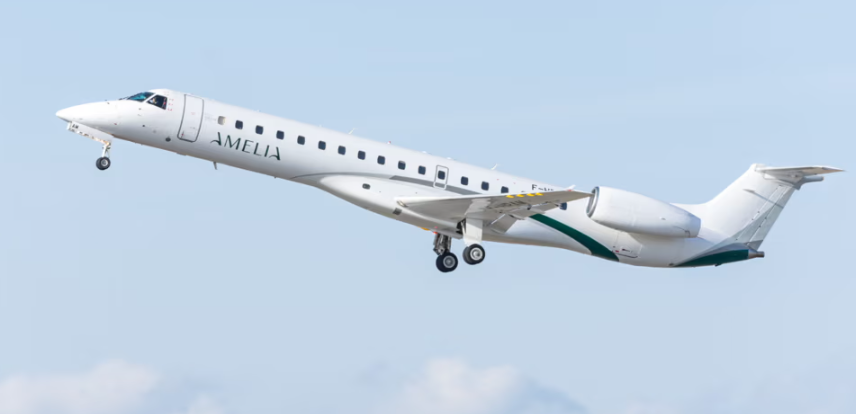Thales, Amelia and Breakthrough Energy Contrails launch one of world's largest Contrail Avoidance campaigns

Thales, in partnership with Amelia and Breakthrough Energy Contrails, takes a major step towards more environmentally friendly aviation, by implementing an innovative contrail avoidance solution.
Since June 2024, Thales' contrail avoidance solution has been deployed on all Paris-Valladolid flights operated by Amelia, using Embraer ERJ145 aircraft. This initiative is part of the DECOR project, supported by France's 2030 investment plan.
Contrails, the artificial clouds produced by aeroplanes, trap heat from the sun, playing a role similar to that of greenhouse gases and thus significantly contributing to global warming. The impact of contrails can represent a significant part of the total climate footprint of aviation, rivalling even that of CO2.
By integrating its solution with Amelia’s Operational Control Center (OCC) tools, Thales enables OCC operations agents to directly obtain alternative trajectories to their flight plans, combining controlled operational impact and a significant reduction in contrails.
When a significant impact of contrails is detected, the Thales solution, Flights Footprint, suggests flight alternatives that allow for a significant reduction in climate impact, with a minimum average decrease of up to 40% in the total climate impact of the flight. This flight optimization relies solely on adjustments to the aircraft's altitude, without changing their route, which helps to keep additional fuel consumption to below 3%.
Yannick Assouad, Executive Vice-President, Avionics, Thales said: “Thales' contrail avoidance solution is a first for France. It is fully aligned with Thales' strategy aiming to transform the aerospace industry towards a more environmentally-friendly future through technology, for more sustainable and responsible aviation”.
Based on proven scientific principles, this innovative solution utilizes the latest weather forecasts and the most advanced climate models provided by Breakthrough Energy Contrails to optimize the flight plan. At the end of each flight, these climate models, enriched by meteorological reanalysis data, are applied to the actual flight path of the aircraft to assess the effectiveness of avoiding contrail formation areas. Additionally, the installation of a ground camera, supplied by Reuniwatt, enables the solution's effectiveness to be validated through the direct observation of contrails, thanks to the analyses conducted in partnership with the digital services company SII.
This project has prevented an average of more than 4 tons of CO2 equivalent (CO2eq) per flight, initially affected by contrails. Amelia has decided to extend this system to eligible flights in 2025, becoming the first airline to systematically implement a contrail avoidance approach.
Adrien Chabot, Director of Sustainable Development at Amelia said: “Taking condensation trails into account allows for the analysis of the total climate impact of our operations and thus a better optimization of them. The challenge is to significantly and quickly reduce our impact on climate change by continuing the deployment of the Thales solution initiated in 2022. Today, it is probably one of the most promising approaches in terms of cost/benefit regarding climate impact.”
This solution, accessible and easily deployable, creates new horizons for all airlines, paving the way for more sustainable and responsible aviation on a global scale.
Matteo Mirolo, Head of Strategy at Breakthrough Energy Contrails said: "The impact of contrails on the climate, similar to that of CO2, is one of the major challenges of the ecological transition in aviation. We are delighted to collaborate with Thales to implement large-scale pilot avoidance campaigns, like this one done with Amelia, which are crucial when considering the eventual deployment of systematic avoidance measures."






.png)





.jpg)
Comments
There are no comments yet for this item
Join the discussion